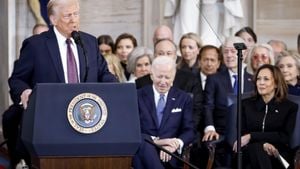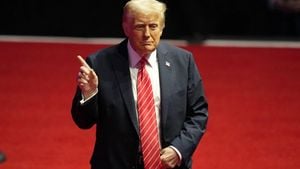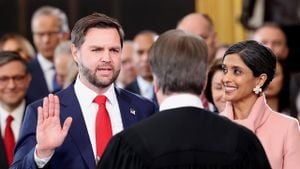President Donald Trump has made it clear he intends to kick off his presidency with some bold moves, including the renaming of two significant American landmarks.
During his inaugural address, Trump confirmed plans to rename Alaska's Denali back to Mount McKinley and the Gulf of Mexico to the Gulf of America. These changes aim to honor what he describes as "American greatness" and pay tribute to former President William McKinley, underlining Trump's admiration for the late leader's legacy.
Trump stated, "A short time from now, we will be changing the name of the Gulf of Mexico to the Gulf of America and we will restore the name of a great president, William McKinley, to Mount McKinley, where it should be and where it belongs." This declaration was part of his broader vision to reinvigorate nationalist sentiments among Americans, as he pushes for policies grounded in the glory of the nation’s past.
The Gulf of Mexico, which borders five states—Texas, Louisiana, Mississippi, Alabama, and Florida—has been one of the premier locations for offshore petroleum production, making its renaming to Gulf of America symbolically significant as Trump aims to bolster energy production. The Gulf is described by Trump as pivotal for maritime industry, tourism, fishing, and recreation.
During his presidency, Barack Obama officially renamed Mount McKinley to Denali, which honors the original Athabascan name used by Alaska Natives. The mountain, standing at 20,310 feet, is the highest peak in North America and has long been the subject of name disputes between local indigenous tribes and those favoring the historical name after President McKinley, the 25th president of the U.S. who has been pivotal to Trump’s political views surrounding tariffs and expansionist policies.
Trump has commented, "McKinley was a very good, maybe a great president" reflecting the admiration he has for McKinley’s approach to tariffs and economic growth.
The push to rename Denali back to Mount McKinley has faced strong opposition from Alaska's own senators, Lisa Murkowski and Dan Sullivan, both expressing their preference for the name Denali, reflecting the local Native Alaskan culture. Murkowski firmly stated, "There is only one name worthy of North America’s tallest mountain: Denali - the Great One." This resistance showcases the conflicting narratives around American identity—narratives Trump’s renaming gestures appear to dismiss.
The renaming process is expected to begin with executive orders to be signed on Trump's first day as president, signaling his seriousness about these changes. The executive orders will direct the Secretary of the Interior to implement the changes on federal maps, though it remains unclear how these new names will be received outside federal governance—particularly within educational and private sectors.
The historical significance of these name changes is rooted deep within political traditions, with Denali previously recognized as Mount McKinley from 1917 until Obama's actions. The Koyukon Athabascan people had long referred to it as Denali, meaning “the Great One,” which they argue reflects their cultural heritage. Despite the legislation passed by Congress supporting the designation of Mount McKinley for nearly four decades, there remains unresolved tension over acknowledging indigenous names and history.
Compounding these issues, statements from Trump indicate his intention to assert American sovereignty over shared resources within the Gulf of Mexico. He labeled the Gulf as “our gulf,” making it clear his desire to remove Mexican influence from the naming, which resonates with his previous immigration policies and sentiments. His statement, "It's what the entire world should refer to it as" speaks volumes about his nationalist vision.
While Trump's plans signify restoration from his perspective, they may also spark new levels of contention—not only over the names but also over the historical narratives those names represent. Native leaders and cultural proponents warn against renaming efforts perceived as erasing indigenous histories.
Opponents are prepared to mobilize their arguments against these changes. Critics suggest renaming Denali could pose challenges to Alaska's diverse culture and undermine the efforts made previously to honor its original name.
Shifting place names often reflect wider societal discussions on heritage, representation, and respect for the voices of indigenous peoples. The proposed changes by Trump do not merely provoke rumors; they invigorate long-standing clashes between historical figures’ legacies and the authenticity of local cultures.
With the backdrop of these renaming debates, attention now turns to how Trump will manage his relationship with state officials and the indigenous groups resistant to his plans. The long-lasting effects of these renamings could redefine not only official documentation but how America perceives its historical and cultural identity.
Trump's presidency promises to usher renewed attention on America's landmarks, rebranding them according to his vision. On the other hand, the reactions from various stakeholders will indicate whether these changes unite Americans or deepen existing rifts.



